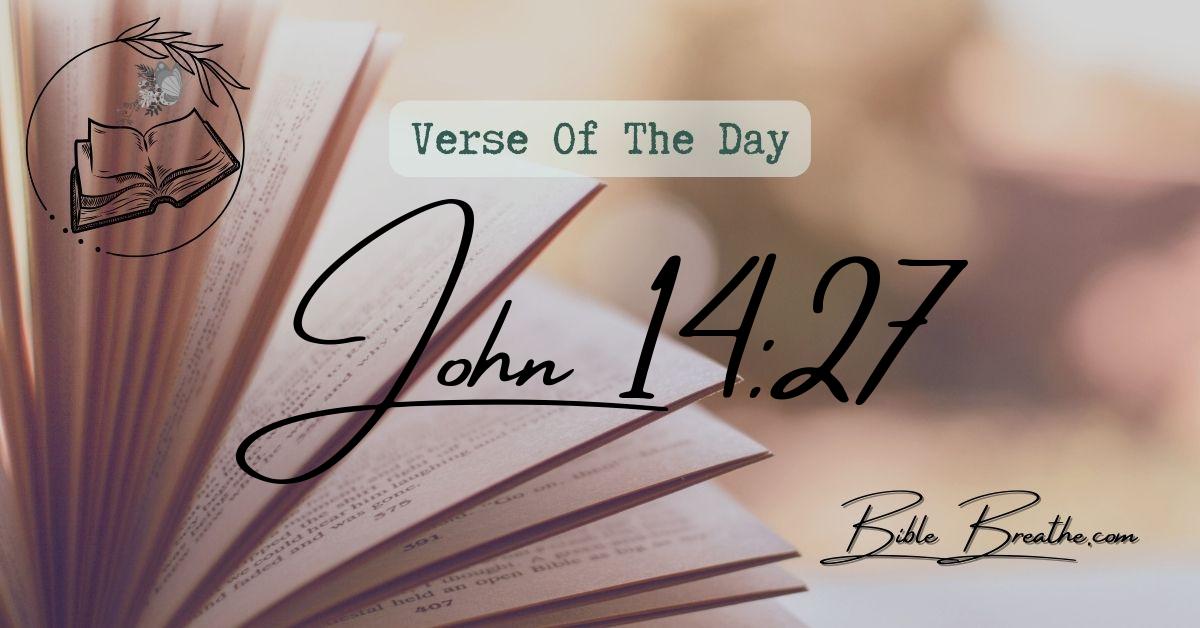John 14:27, fam!
It’s like a treasure map to finding peace in life’s chaos, straight outta the Book of John.
Jesus drops a truth bomb, leaving his squad an epic gift—peace from Christ.
This verse is a game-changer, a compass guiding us through rough seas.
Check it—Jesus ain’t talking about the regular peace you’d find on Insta or TikTok.
Nah, He’s offering something on a whole different level, not the typical peace the world hands out.
This is some next-level, divine chill—the kind that keeps you steady when life throws curveballs.
Think of it like this: life’s a rollercoaster, right?
But Jesus’s words?
They’re like the secure harness keeping us safe when things get wild.
His promise of Christ’s calming assurance is the ultimate stress-buster for when life gets cray.
What’s epic is that this ain’t just for back in the day.
It’s a timeless message, still hitting us hard in a world full of chaos.
So, let’s dig into this verse together, unwrap its wisdom, and see how it’s speaking to us RN.
‘Cause here’s the deal—Jesus got something real to say about finding peace that blows our minds.
“Peace I leave with you, my peace I give unto you.” 🌟
“Peace I leave with you, my peace I give unto you: not as the world giveth, give I unto you. Let not your heart be troubled, neither let it be afraid.” – John 14:27 (KJV)
Key Takeaways
- John 14:27 isn’t just about peace; it’s about a divine tranquility that the world can’t give or take away. Imagine being in the eye of a storm, where everything’s calm, even when chaos whirls around. That’s the kind of peace Jesus gifts.
- Christ’s calming assurance in this verse reminds us that we shouldn’t let our hearts be troubled. Just like a loving parent hushing their child’s fears, Jesus assures us that His peace surpasses our worldly understanding.
- In our frantic, 24/7 world, embracing the peace “not as the world gives” means finding stillness in God’s presence, even when our phones buzz, and our to-do lists grow.
- Overcoming worldly troubles, as mentioned in John 14:27, isn’t about evading challenges, but anchoring ourselves in Christ’s love and promise, like a ship anchored firmly despite raging waves.
- When anxiety or stress knock on our door, John 14:27 is our call to remember that we’ve been handed the master key to divine tranquility. It’s our choice to unlock and walk into that space of serenity.
John 14:27: Christ’s Calming Assurance
Welcome, beloved community, to the tranquil words of Jesus found in John 14:27.
In this powerful verse, Jesus bestows upon us a peace unlike any other—a divine tranquility that surpasses the fleeting offerings of the world.
As we delve into this verse, let’s uncover the profound assurance Christ provides amidst life’s tribulations.
Verse of the Day:
“Peace I leave with you, my peace I give unto you: not as the world giveth, give I unto you. Let not your heart be troubled, neither let it be afraid.” – John 14:27, KJV
Basic Facts of the Verse:
| **Attribute** | **Value** |
|---|---|
| Book | Gospel of John |
| Chapter | 14 |
| Verse | 27 |
| Christian Bible Part | New Testament |
| KEYWORDs | Peace, Christ, heart, troubled, afraid |
| Topics | Peace, Assurance, Fearlessness |
| Bible Themes | Divine Peace, Comfort |
| People | Jesus |
| Location | Jerusalem (contextual) |
As we absorb these divine words, let’s take comfort in the calming assurance Christ offers, transcending the troubles of this world.
Let your hearts rest in His unwavering peace, unshaken by worldly turmoils.
John 14:27 KJV Cross References
These are some Bible verses related to John 14:27:
| **Cross Reference Verse (KJV)** | **Verse** |
|---|---|
| Matthew 11:28 | Come unto me, all ye that labour and are heavy laden, and I will give you rest. |
| Philippians 4:7 | And the peace of God, which passeth all understanding, shall keep your hearts and minds through Christ Jesus. |
| Isaiah 26:3 | Thou wilt keep him in perfect peace, whose mind is stayed on thee: because he trusteth in thee. |
| Colossians 3:15 | And let the peace of God rule in your hearts, to the which also ye are called in one body; and be ye thankful. |
| Psalm 29:11 | The LORD will give strength unto his people; the LORD will bless his people with peace. |
| John 16:33 | These things I have spoken unto you, that in me ye might have peace. In the world ye shall have tribulation: but be of good cheer; I have overcome the world. |
| Romans 5:1 | Therefore being justified by faith, we have peace with God through our Lord Jesus Christ. |
| 2 Thessalonians 3:16 | Now the Lord of peace himself give you peace always by all means. The Lord be with you all. |
| Isaiah 9:6 | For unto us a child is born, unto us a son is given: and the government shall be upon his shoulder: and his name shall be called Wonderful, Counsellor, The mighty God, The everlasting Father, The Prince of Peace. |
Historical and Cultural Context

Photo modified by BibleBreathe.com. Original photo by Element5 Digital on Pexels
During the era when John penned down these words in his Gospel, the Roman Empire dominated vast regions, enforcing peace, albeit through oppressive means – often referred to as the Pax Romana.
This peace, however, was superficial and rested upon the suffering and submission of the conquered.
Imagine the confusion, then, when Jesus, a carpenter-turned-teacher, says, “Peace I leave with you; my peace I give you. I do not give to you as the world gives.” (John 14:27).
When the world around you is tumultuous, and your “peace” comes at the point of a Roman spear, what could Jesus possibly be offering?
In this cultural context, peace was a luxury, almost a far-off dream.
But Jesus wasn’t speaking of political tranquility or the absence of conflict.
He was addressing the soul’s deepest yearnings, presenting a peace rooted in divine assurance, not earthly circumstances.
It’s like comparing the fleeting calm of a pond’s surface to the profound depths of an ocean – both are water, but one is superficial, while the other is deep and boundless.
Furthermore, societal norms demanded an eye for an eye, especially under Roman jurisdiction.
Yet, Christ’s peace was about forgiveness, mercy, and a tranquility that transcended understanding.
In ancient times, such an idea was revolutionary!
For many, it was a balm to the weary soul, a refuge from the storms of life.
So, when you read John 14:27 and reflect on the phrase, “Not as the world gives,” think about the radical nature of Jesus’ offer.
It was, and still is, an invitation to a peace that overcomes worldly troubles, providing a divine tranquility that the world, with all its might and riches, can never grant.
How many of us, caught in the whirlwind of today’s challenges, yearn for such a peace?
And isn’t it awe-inspiring that this ancient promise remains as valid and potent today as it was back then?
Verse Analysis and Literal Interpretation
Let’s unpack John 14:27, the way you would unlace a tightly knotted sneaker after a long run, revealing its depth and essence:
- “Peace I leave with you”:
- Peace: In the original Koine Greek, the word is “εἰρήνη” (eirēnē). Unlike the world’s shallow notion, it’s a deep-rooted divine tranquility. This isn’t just a casual peace; it’s peace from Christ Himself.
- I leave with you: Jesus isn’t merely offering a temporary feel-good vibe. He’s bequeathing a lasting legacy, a mantle of Christ’s calming assurance.
- “My peace I give to you”:
- Emphasizing the uniqueness of this gift. This isn’t peace as the world perceives, which is often fleeting. Instead, it’s the kind that endures, rooted in the divine, capable of overcoming worldly troubles.
- “Not as the world gives do I give to you”:
- A vivid contrast. The world might offer temporary solace, but Christ’s peace? It’s different, deeper. Ever tried comparing the fleeting calm of a movie ending to a grandmother’s lullaby? That’s the distinction.
- “Let not your heart be troubled, neither let it be afraid”:
- Beyond just words, this is an invitation. An invitation to trust in this peace from Christ, to lean on it when the storms of life roll in. It’s a call to embrace that divine tranquility, to let it shield our hearts from fear.
The whole of John 14 resonates with themes of assurance and the promise of the Holy Spirit.
Set against the backdrop of looming trials and Christ’s impending crucifixion, this verse is like a beacon, guiding believers toward hope and steadfastness.
Here’s the real question, folks: In a world filled with quick-fix solutions and fleeting joys, are we ready to embrace and champion the unshakable peace that Christ offers?
Comparative and Literary Analysis: John 14:27
John 14:27 reads, “Peace I leave with you; my peace I give to you. Not as the world gives do I give to you. Let not your hearts be troubled, neither let them be afraid.”
Let’s delve deep into the pools of literature and draw comparisons from various religious texts.
Similarities with other religious texts
- Qur’an (Surah As-Salam 59:23): The Qur’an also speaks about peace as a divine attribute. Like the peace from Christ, the Qur’an describes God as “The Source of Peace.”
- Bhagavad Gita (5.29): Lord Krishna bestows peace to His devotees, ensuring them they need not fear. This resonates with the Christ’s calming assurance in John.
- Dhammapada (Chapter 5: Verse 197-199): Buddha speaks about attaining the ultimate peace, Nibbana, much akin to the divine tranquility spoken about in John.
- Tao Te Ching (Chapter 16): Emphasizes knowing the eternal, which leads to insight, and in its absence, there’s chaos and disorder. It alludes to the peace one gets from understanding the eternal Tao, a sentiment echoing the peace Christ imparts.
Differences with other religious texts
- Emphasis on ‘Worldly Giving’: John 14:27 distinctly states “Not as the world gives.” This specific emphasis, contrasting divine peace with worldly offerings, is unique.
- Personal Assurance: Jesus offers His peace in a deeply personal manner, almost like handing over a cherished possession. It’s a direct comfort, something not always seen in other texts.
- Overcoming Worldly Troubles: While many religious scriptures discuss the concept of peace, the way John describes it as a tool for overcoming worldly troubles stands out.
- Origin of Peace: In John, Jesus presents Himself as the direct source of this peace. In other texts, peace often stems from following teachings or practices.
Have you ever felt overwhelmed, seeking solace in a friend’s counsel or a motivational book?
Yet, that peace seems temporary, doesn’t it?
John 14:27 isn’t just offering a peace; it’s offering a transformative experience.
How are you letting this divine tranquility reshape your storms?
Theological Implications and Modern Interpretations: John 14:27
Remember when you were a child, and a simple hug from a parent could melt away the world’s chaos?
John 14:27 reads, “Peace I leave with you; my peace I give you.
Not as the world gives do I give to you.
Let not your hearts be troubled, neither let them be afraid.” But like a hug, interpretations of this scripture vary across Christian denominations.
The peace from Christ is universal, yet its understanding?
Not quite.
How different religious groups interpret the verse:
- Roman Catholicism: Views it as an affirmation of the Sacrament of Reconciliation. This divine tranquility is bestowed through confession and penance.
- Eastern Orthodox: Emphasizes the mystical experience. It’s an invitation to participate in Christ’s eternal peace through the Holy Mysteries.
- Protestantism: Highlights the Christ’s calming assurance as a direct, personal relationship with believers. Christ’s peace is not dependent on rituals or clergy but faith alone.
- Seventh-day Adventists: Understands the verse in the context of the Sabbath, a day to experience God’s divine tranquility and overcome worldly troubles.
- Mormonism: It’s believed that this peace is profound, found through the teachings of modern prophets and personal revelation.
- Jehovah’s Witnesses: The peace from Christ is seen as an assurance of God’s Kingdom. It’s a promise to those loyal to Jehovah.
Embedded in the broader narrative, this verse is a promise of Christ’s unwavering presence.
He offers a peace different from worldly peace, one that stands even in tribulations.
However, debates arise in today’s world.
How do we, filled with daily anxieties and fears, genuinely grasp this peace?
Is it metaphorical, a state of mind, or an actual divine intervention?
Rhetorically speaking, in an era of instant gratification, can we wait and actively seek this peace, or do we want it now, as the world gives?
In the cacophony of interpretations, the verse stands as a lighthouse, guiding us towards Christ’s calming assurance amidst the storms.
Bridging John 14:27 and Modern Science: A Divine Harmony?

Photo modified by BibleBreathe.com. Original photo by Pixabay on Pexels
Picture this: We’re living in a world where our understanding of peace has been recalibrated by both the wisdom of John 14:27, “Peace I leave with you; my peace I give you. I do not give to you as the world gives. Do not let your hearts be troubled and do not be afraid,” and the ever-evolving lens of science.
These two realms, often painted in contrast, might just be singing harmoniously in the same key.
How the verse aligns or contrasts with current scientific understanding:
In the intricate dance of faith and science, John 14:27 serves as a bold statement about the peace from Christ — a kind of tranquility not manufactured or replicated in any lab.
It’s a peace contrasting with what the world offers, speaking to a divine tranquility beyond the tangible.
Modern science frequently tackles mental health, especially in deciphering the complexities of human emotions.
Findings show that peace, or a calm state of mind, immensely benefits our physiological and psychological well-being.
Yet, what science often identifies as peace is built on external factors — think stress-relief techniques, medication, or therapy.
Valuable?
Yes.
But is it the same Christ’s calming assurance?
Perhaps not as the world gives.
The intriguing part?
Studies have shown prayer, meditation, and spiritual practices activate parts of the brain associated with comfort and assurance.
Isn’t it fascinating to think that, perhaps, our very biology responds to the overcoming worldly troubles through divine channels?
However, while science can gauge reactions, the depth of spiritual peace — that profound divine tranquility Jesus speaks of — remains intangible.
It’s something more profound, intrinsic, and not wholly understood by empirical measures alone.
In the midst of worldly chaos, science seeks solutions to pacify the troubled heart.
But the rhetorical question here is: Can anything truly match the unique serenity offered by Christ, even in our technologically advanced age?
John 14:27: Navigating Life with Divine GPS
Imagine you’re on a tumultuous sea, waves crashing, winds howling, and amidst the chaos, a voice whispers, “Peace, be still.”
This is the essence of John 14:27, where Jesus says, “Peace I leave with you; my peace I give to you.
Not as the world gives do I give to you.
Let not your hearts be troubled, neither let them be afraid.” But how do we anchor this peace from Christ in the daily hustle and bustle of our lives?
Practical Application of John 14:27
In a world that’s constantly shifting, where peace often feels like a fleeting mirage, this verse offers a wellspring of divine tranquility.
It’s not just about a momentary calm but a deep-seated assurance that transcends our worldly understanding.
So, how can we practically apply this in our daily decisions?
- Recognize the Source: Understand that the peace Jesus offers is different. It’s not as the world gives. While the world’s peace is temporary and often based on circumstances, Christ’s peace is eternal and unchanging. When faced with decisions, ask yourself: Am I seeking peace from worldly validations or from Christ’s calming assurance?
- Confront the Chaos: Every day, we face storms – be it in relationships, work, or personal challenges. Instead of being overwhelmed, remember John 14:27. Visualize Jesus standing amidst your storm, offering you His peace. This visualization can shift your perspective from panic to peace.
- Decision-making with Divine Tranquility: Before making any decision, big or small, pause. Take a deep breath and invite Christ’s peace into the process. Ask yourself: Does this decision align with the peace Jesus offers? If there’s unrest in your heart, it might be a sign to reconsider.
- Overcome with Assurance: When doubts and fears threaten to derail you, lean into the promise of overcoming worldly troubles with Christ’s peace. It’s not about ignoring problems but facing them with a heart anchored in divine assurance.
- Daily Affirmation: Start or end your day by reciting John 14:27. Let it be a reminder of the peace available to you, a peace that the world can neither give nor take away.
In conclusion, as we navigate the seas of life, may we always be guided by the divine GPS of John 14:27.
Why settle for the world’s fleeting calm when we can anchor ourselves in the eternal peace of Christ?
After all, isn’t it time we moved from merely surviving the storms to dancing in the rain, with hearts unburdened and spirits unbroken?
John 14:27: Delving Deeper into Christ’s Peace in a World of Chaos

Photo modified by BibleBreathe.com. Original photo by Pixabay on Pexels
In a world rampant with chaos, the tranquility offered by Christ is not just a message; it’s a lifeline.
Just as the peace offered by a gentle stream contrasts sharply with a bustling city street, so does Christ’s calming assurance differ from the fleeting comfort the world provides.
Exegetical Questions and Critical Thinking for Engagement:
In this pivotal section, I invite you, dear reader, to wade into the deeper waters of John 14:27.
Let’s not merely skim the surface, but plunge in, extracting every drop of wisdom and revelation this scripture holds for us.
- How does the “peace” offered by the world differ from the “Peace from Christ”? Can you delineate the temporary from the eternal?
- When Jesus mentions “Not as the world gives”, what worldly offers or assurances might He be referencing? Think about the temporal pleasures and short-lived guarantees that surround us daily.
- In what ways can we hold onto Christ’s calming assurance amidst our personal storms and challenges? How does divine tranquility manifest in our day-to-day lives?
- How can believers be channels of “overcoming worldly troubles” for others, rooted in the peace Christ bestows?
Now, let’s apply this profound scripture to our real-world context:
- Imagine a colleague at work ridicules your faith, attributing your peace to ignorance. How would you apply John 14:27 in this scenario?
- You stumble upon an online debate, where one side argues that lasting peace comes from achieving personal and professional milestones, while the other side insists on spiritual fulfillment. Where does John 14:27 fit in this conversation?
- A close friend, undergoing a challenging phase, asks you about the source of your peace. How would you employ John 14:27 to console and guide them?
Bringing our exploration closer to recent events:
- News Flash: “Global protests erupt demanding peace and justice.” How can believers present the truth of John 14:27, emphasizing the unique peace Christ brings amidst societal unrest?
- Breaking News: “Economic downturn causes widespread anxiety and despair.” In light of John 14:27, how can Christians provide hope and perspective to those drowning in worldly troubles?
To truly comprehend John 14:27 is to understand that the peace of Christ is unparalleled, unshakable, and unmatched.
In a world that often confuses silence with peace, may we continually strive to grasp, experience, and share the divine tranquility that only Christ can offer.
Frequently Asked Questions (FAQs) About John 14:27
What is the significance of the peace that Jesus gives, as mentioned in John 14:27?
John 14:27 highlights the unique peace that Jesus gives, distinct from worldly peace.
This peace transcends circumstances and is rooted in a deep relationship with Christ.
It signifies a profound inner tranquility and assurance that believers can experience despite external challenges.
The peace of Christ provides a stable foundation amid life’s uncertainties.
How can believers experience and maintain the peace spoken of in John 14:27 in the midst of challenges?
Believers can experience and maintain peace by anchoring themselves in Christ.
This involves trusting His sovereignty, relying on prayer and meditation on Scripture, and surrendering anxieties.
Cultivating a mindset of gratitude and focusing on God’s promises, especially in challenging times, sustains the peace that surpasses understanding, as spoken of in John 14:27.
Are there other Bible verses that complement the message of peace conveyed in John 14:27?
John 14:27 conveys Jesus’ promise of peace.
Complementing verses include Philippians 4:6-7, encouraging prayer for peace, and Isaiah 26:3, highlighting God’s gift of perfect peace to those who trust in Him.
Collectively, these verses emphasize the source and assurance of peace found in faith and trust in God.
In what ways does John 14:27 provide comfort and assurance to followers of Jesus?
John 14:27 records Jesus promising peace and reassurance.
This verse provides comfort by assuring believers of the peace Christ offers amidst life’s uncertainties.
It emphasizes the distinct peace derived from faith in Christ, offering solace and encouragement to followers who navigate challenges with the knowledge of Christ’s enduring presence and comforting peace.
Can you provide insights into the cultural and historical context influencing the words of Jesus in John 14:27?
The cultural context of John 14:27 includes a tense political atmosphere.
Jesus speaks to disciples facing Roman oppression and social unrest.
His promise of peace goes beyond the conventional understanding, offering a profound spiritual peace rooted in trust in God.
This context amplifies the significance of Jesus’ words, providing reassurance amid cultural and political turmoil.
Matt Turner
I’m Matt, and I love breaking down Bible verses in a way that’s easy to understand and apply to everyday life. My goal is to help you connect with God’s Word and find practical ways to live it out. Whether you’re new to the Bible or just looking for some fresh insights, I’m here to walk with you and share what I’ve learned along the way.

